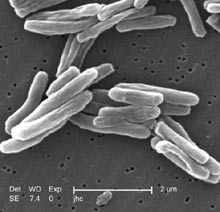From Wikipedia, the free encyclopedia
 |
This is a file from the Wikimedia Commons. The description on its description page there is shown below.Commons is a freely licensed media file repository. You can help.
|
| Description |
English: Under a high magnification of 15549x, this scanning electron micrograph (SEM) depicted some of the ultrastructural details seen in the cell wall configuration of a number of Gram-positive Mycobacterium tuberculosis bacteria. As an obligate aerobic organism M. tuberculosis can only survive in an environment containing oxygen. This bacterium ranges in length between 2 - 4 microns, and a width between 0.2 - 0.5 microns. See PHIL 9997 for a colorized version of this image. TB bacteria become active, and begin to multiply, if the immune system can't stop them from growing. The bacteria attack the body and destroy tissue. If in the lungs, the bacteria can actually create a hole in the lung tissue. Some people develop active TB disease soon after becoming infected, before their immune system can fight off the bacteria. Other people may get sick later, when their immune system becomes weak for another reason. Babies and young children often have weak immune systems. People infected with HIV, the virus that causes AIDS, have very weak immune systems. Other people can have weak immune systems, too, especially people with any of these conditions: substance abuse; diabetes mellitus; silicosis; cancer of the head or neck; leukemia or Hodgkin's disease; severe kidney disease; low body weight; certain medical treatments (such as corticosteroid treatment or organ transplants); specialized treatment for rheumatoid arthritis, or Crohn's disease
Français : Mycobacterium tuberculosis grossi 15 549 fois.
Español: Mycobacterium tuberculosis ampliado a 15549x.
中文: 掃描電子顯微鏡下的結核桿菌.
Suomi: Mycobacterium tuberculosis 15549-kertaisena suurennoksena.
Česky: Bakterie Mycobacterium tuberculosis, původce TBC.
Magyar: Mycobacterium tuberculosis.
한국어: 결핵균의 전자현미경 사진.
Simple English: TB Bacteria.
Kurdî / كوردی: Girtineke elektronmîkroskobîk a bakteriyên tûberkûlozê pêk tînin.
Afrikaans: 'n Skanderende mikrograaf van Mycobacterium tuberculosis.
粵語: 掃描電子顯微鏡下嘅結核桿菌.
|
| Source |
 |
This media comes from the Centers for Disease Control and Prevention's Public Health Image Library (PHIL), with identification number #8438. Note: PHIL pages cannot be bookmarked; instead enter 8438 into the ID search page. Not all PHIL images are public domain; be sure to check copyright status and credit authors and content providers. |
- Transferred from en.wikipedia
|
| Date |
2006
- 2006-10-06 (original upload date)
|
| Author |
- Photo Credit: Janice Carr
- Content Providers(s): CDC/ Dr. Ray Butler; Janice Carr
- Original uploader was TimVickers at en.wikipedia
|
Permission
( Reusing this image) |
PD-USGov-HHS-CDC English: None - This image is in the public domain and thus free of any copyright restrictions. As a matter of courtesy we request that the content provider be credited and notified in any public or private usage of this image.
|
| Other versions |
|
Licensing
 |
This image is a work of the Centers for Disease Control and Prevention, part of the United States Department of Health and Human Services, taken or made during the course of an employee's official duties. As a work of the U.S. federal government, the image is in the public domain. |
|
Original upload log
The original description page is/was here. All following user names refer to en.wikipedia.
- 2006-10-06 23:04 TimVickers 220×212×8 (10514 bytes) Janice Carr, CDC, http://www.cbc.ca/health/story/2006/03/17/tb-who060317.html?ref=rss
File history
Click on a date/time to view the file as it appeared at that time.
|
|
Date/Time |
Dimensions |
User |
Comment |
| current |
00:53, 9 July 2008 |
220×212 (10 KB) |
Reborned |
|
File links
The following pages on Schools Wikipedia link to this image (list may be incomplete):



